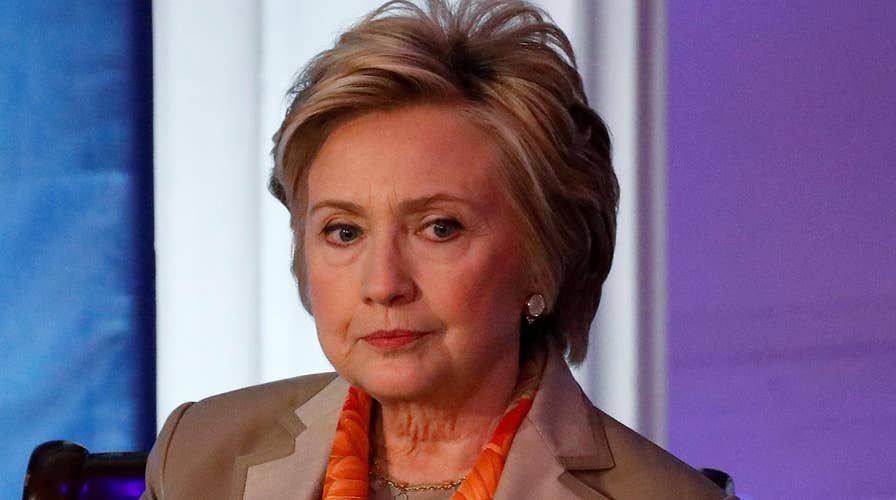Rush to partisan politics in Las Vegas shooting aftermath?
The 'Outnumbered' panel reacts to Democrats releasing statements on gun control.
Hillary Clinton took heat Monday for issuing what critics called an “ignorant” and “irrelevant” statement going after the NRA and silencers in the hours after the Las Vegas mass shooting.
As details were still emerging about the worst mass shooting in modern U.S. history – which killed at least 58 people – the 2016 Democratic presidential nominee took to Twitter to imagine how much deadlier the massacre might have been if silencers had been used.
“The crowd fled at the sound of gunshots. Imagine the deaths if the shooter had a silencer, which the NRA wants to make easier to get,” she tweeted, adding: “Our grief isn't enough. We can and must put politics aside, stand up to the NRA, and work together to try to stop this from happening again.”
It was an apparent reference to the NRA’s push to ease federal rules for silencers.
But conservative critics quickly hit back, saying silencers probably would only moderately dampen the sound of gunfire in this kind of attack – especially from what was described as a high-powered weapon.
“Suppressors only reduce by a few decibels, still same decibel level as a jackhammer,” tweeted Dana Loesch, a talk radio host and NRA spokeswoman.
Conservative commentator Ben Shapiro, editor in chief of The Daily Wire, blasted Clinton’s tweets as “Ignorant, irrelevant and exploitative.”
Radio host and CIA veteran Buck Sexton had a similar take: “Appallingly stupid, and entirely irrelevant, Mrs Clinton She knows nothing about firearms, and even worse, she doesn't care.”
White House Press Secretary Sarah Sanders also pushed back when asked about Clinton’s statements at Monday’s briefing.
“I think before we start trying to talk about the preventions of what took place last night, we need to know more facts, and right now we’re simply not at that point,” Sanders said. “It is very easy for Mrs. Clinton to criticize and to come out, but I think we need to remember the only person with blood on their hands is that of the shooter, and this isn’t a time for us to go after individuals or organizations. I think we can have those policy conversations but today is not that day.”
It’s unclear what weapons the shooter, identified as 64-year-old Stephen Paddock, was using. Witnesses described the sound of rapid automatic gunfire – which many believed to be firecrackers – ringing out as thousands ran for cover. One vendor told Fox News that “it sounded like a machine gun.” Authorities said the shooter had more than 10 rifles in the hotel room where he fired on concert-goers below.
The casualties in the attack exceeded those of the Pulse nightclub tragedy in Florida more than a year ago. As with the Pulse attack, the Las Vegas shooting led to prompt calls from Democrats – not just Clinton – for gun legislation, though the party has struggled to tighten laws even when the Obama administration was in power.
Connecticut’s senators, who have been especially outspoken on gun control ever since the 2012 Sandy Hook Elementary School shooting, were among the first to issue statements Monday.
“Nowhere but America do horrific large-scale mass shootings happen with this degree of regularity,” Sen. Chris Murphy, D-Conn., said in a statement. “This must stop. It is positively infuriating that my colleagues in Congress are so afraid of the gun industry that they pretend there aren't public policy responses to this epidemic. There are, and the thoughts and prayers of politicians are cruelly hollow if they are paired with continued legislative indifference. It's time for Congress to get off its ass and do something."
Connecticut’s other Democratic senator, Richard Blumenthal, issued a similar statement.
“It has been barely a year since what was previously the largest mass shooting in American history – the deadly attack at Pulse nightclub. In the interim, thousands more have been lost to the daily, ruthless toll of gun violence. Still, Congress refuses to act. I am more than frustrated, I am furious,” he said.
As the lawmakers seemed to acknowledge, gun legislation stands little chance of passing under a Republican-controlled Congress and White House.
After the Pulse shooting, Senate Democrats launched a 15-hour filibuster followed by a Democratic sit-in on the House floor in a high-profile push for gun control legislation. But the divided Senate ultimately rejected all four gun measures put on the floor for a vote.
The battle over gun restrictions has, meanwhile, played out in a more substantive fashion on the state level – and at the courts.
Most recently, a federal appeals court last week delivered a win for gun rights activists by keeping in place another court’s ruling that it was unconstitutional for the District of Columbia to require gun owners to provide a “good reason” for legally carrying a concealed weapon in the nation’s capital. The dispute could be on a path to the Supreme Court.






















